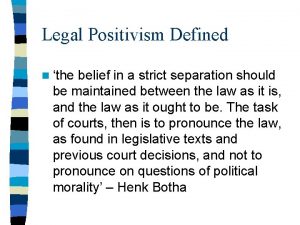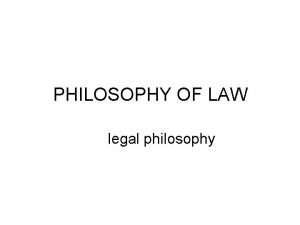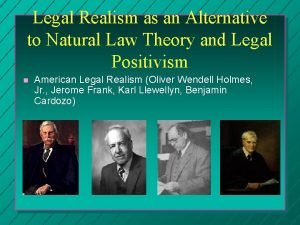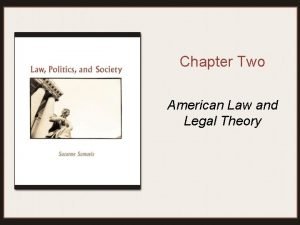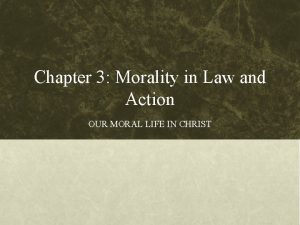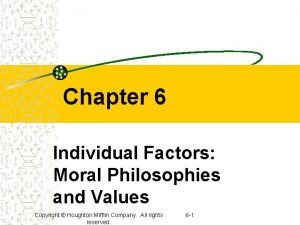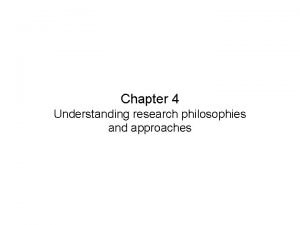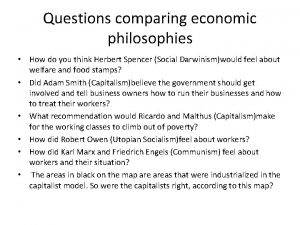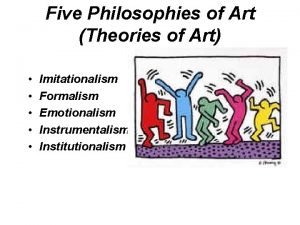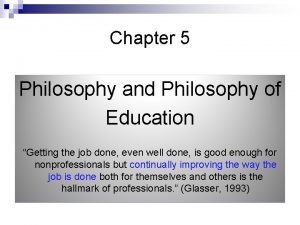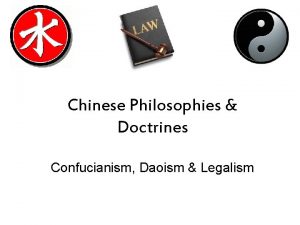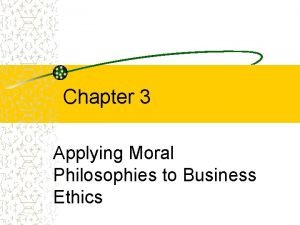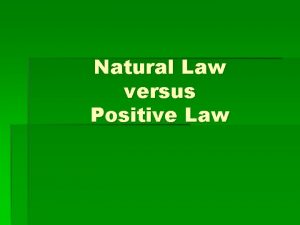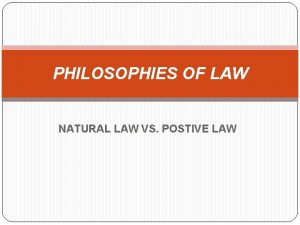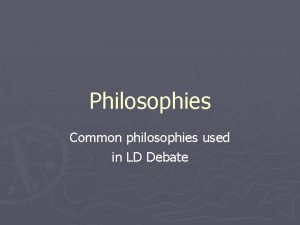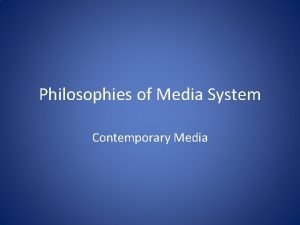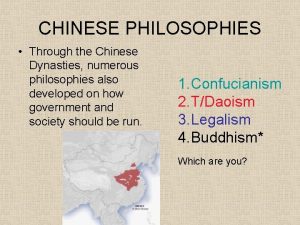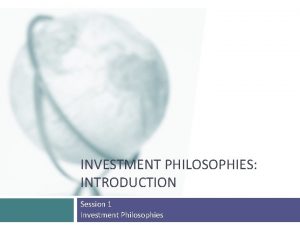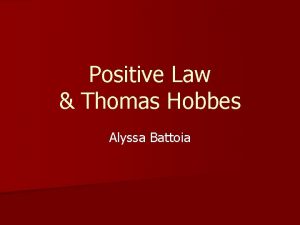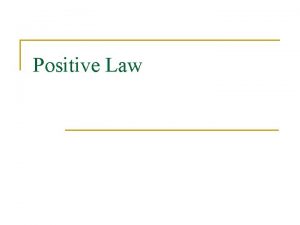PHILOSOPHIES OF LAW NATURAL LAW POSITIVE LAW AND




















- Slides: 20

PHILOSOPHIES OF LAW NATURAL LAW, POSITIVE LAW, AND OTHER PERSPECTIVES

NATURAL LAW The theory that human laws are derived from eternal and unchangeable principles that regulate the natural world. n People can become aware of these laws through the use of reason. n Many natural law philosophers believe that legal rules should be overruled in particular situations if applying them results in moral injustice. n

NATURAL LAW PHILOSOPHERS n SOCRATES: a Greek philosopher who stressed that there was a moral component to the law, and that it must guide people in right living. n Even Socrates’ defence at the legal trial that cost him his life illustrated his belief in disregarding laws to serve a greater moral good, though some argue Socrates was a positive law follower as he said we must follow the law, regardless of the outcome.

PLATO: believed that laws should strive to reflect universal, absolute, and eternal truths or virtues; n n felt humans could never achieve these universal, absolute truth but the laws should; laws should not be servants to the government; believed it is just to disobey an unjust law (recognition of civil disobedience)

ARISTOTLE: founder of contemporary thinking on natural law; n His views on natural law weakened theory that gods gave humans their law; n believe origin of law was in nature which was a part of all things, living or not; n RATIONALISM – man must make laws suitable to their own nature based on reason and observation – this will reveal natural laws for governing human behavior

CICERO: Romans saw theory of natural law as means of justifying their authority for their rapid expansion of their empire; n believed the notion of natural laws as universal and unchanging; n these higher laws presumed a moral and legal superiority; n believed that ideal law was rooted in divine source; n also believed in civil disobedience to compel law makers to reform laws that failed to conform with the laws of nature

ST. THOMAS AQUINAS: believed that law reflected a natural world order which humans learn through their ability to reason plus divine revelation of Christian prophets n He believed there was a connection between reason and law, reason directs us to go good and reject evil; n He felt that the purpose of human law was training to make us virtuous n Because of his belief that justice and rights spring from natural law rather than human law, he is credited with influencing the modern rights theories and laws.

ST. THOMAS AQUINAS CONTINUED n n n Eternal law – eternal government of the universe according to the divine will of god Natural law - the imprinting of eternal law on humans Human law – the laws humans make

R. M. DWORKIN: believes in moral content of law; n legal reasoning is interpretive to make political and moral sense out of a difficult situation or case; n Laws reflect political morality; n favours social justice over individual justice; laws should be the union of widely held, coherent political decisions and judgments.

A SAMPLE NATURAL LAW QUOTE n “an unjust and unreasonable law…is not a law but a perversion of the law. ” St. Thomas Aquinas

FURTHER SUBDIVISIONS OF NATURAL LAW n POPULAR MORALITY: judges should determine what the majority of the community feel is moral as a basis for their judgments. This could be done through the use of public opinion polls when deciding how the law should be applied. n n CRITICAL MORALITY: judges determine what law is by determining what would be fair given the most defensible view of moral standards operating within the community. This view differs from popular morality since the majority of the public may be ill informed or biased.

POSITIVE LAW n Also known as legal positivism; it regards valid law as the command of the sovereign law giver, enforced through a system of sanctions imposed by the sovereign. n There is a denial of the necessary connection between morality and the law. n Whether or not the application of the law in a particular situation may be morally unjust or have undesirable consequences, does not alter what is the legally required decision. Law as it is. n

POSITIVE LAW PHILOSOPHERS THOMAS HOBBES: believed that natural law was a tool for tyrants to justify their authority on eternal laws; n weakness of natural law was the invitation of individuals to define its content – could lead to abuse of law; was not tolerant with civil disobedience

JOHN AUSTIN: main purpose of law is the greatest possible advancement of human happiness n justice and morality are measured by obedience of law; ultimately the function of law is more important than its quality – social utility n believed in UTILITARIANISM – the greatest happiness of the greatest number.

JEREMY BENTHAM: founder of UTILIATARIANISM theory; n Law is a required authoritative body to which citizens are in the habit of obedience; n There should be enforcement through threat of penalties or legal sanctions; imposition of duty of obedience

A SAMPLE POSITIVE LAW QUOTE n “I am not here to dispense justice, I am here to dispose of this case according to the law. Whether this is or is not justice is a question for the legislature to determine. ” Sir Thomas W. Taylor Chief Justice of Manitoba

FURTHER SUBDIVISIONS OF POSITIVE LAW n THE LETTER OF THE LAW: requires that judges stick to the literal meaning of the words. n THE SPIRIT OF THE LAW: allows judges to decide what the rules mean by referring to the goals and purposes of the applied rules. n SO WHAT ABOUT…. ? : The American reference to the right to bear arms.

LEGAL REALISM n n n In reality, natural law and positive law are very theoretical; whereas legal realism focuses on the actual workings of law and legal institutions. (how the system actually operates, not how it is “supposed” to operate) Proponents of legal realism feel that it is misleading to regard law as a system of rules – in practice, the law is what judges decide to enforce. The job of the court/judges is to prune away laws that do not fit. Judges don’t create new laws, but discover the meaning of existing laws and clarify their content. It is a response to “mechanical jurisprudence” – (i. e. letter of the law)

FURTHER SUBDIVISIONS OF LEGAL REALISM n n SOCIOLOGICAL JURISPRUDENCE – argues that legal decisions ought to be decided in light of realistic expectations about the effects of law on society. If law is to be an effective social force, judicial decisions ought not to be a simple application of fixed laws without concern for the effects of such an application in the particular situation involved. LEGAL REALISTS – reverses the perspective by looking at the effects of social factors in shaping legal decisions and legal institutions. The law is what the judge decides to enforce. While the legal rules provide some indication of the decision a judge will reach, judicial decisions are also the product of political compromises, individual personalities and abilities, and judges ’ perceptions of their legal and moral obligations.

HOMEWORK n READ PAGES 80 -82 and TAKE NOTES ON LEGAL REALISM, MARXISM, AND FEMINIST JURISPRUDENCE.
 Natural law and positive law
Natural law and positive law Natural law vs positive law
Natural law vs positive law Positive law vs natural law
Positive law vs natural law Stoicism natural law
Stoicism natural law Natural law vs positive law
Natural law vs positive law Natural law vs positive law
Natural law vs positive law Natural law vs positive law
Natural law vs positive law Individual factors moral philosophies and values
Individual factors moral philosophies and values Research philosophies and approaches
Research philosophies and approaches Tourism: principles, practices, philosophies
Tourism: principles, practices, philosophies Philosophies of total quality management
Philosophies of total quality management Comparing economic philosophies worksheet answers
Comparing economic philosophies worksheet answers State 4 philosophies of extension education
State 4 philosophies of extension education Investment philosophies aswath damodaran
Investment philosophies aswath damodaran Damodaran.com
Damodaran.com Marketing philosophies
Marketing philosophies Instrumentalism artwork example
Instrumentalism artwork example Lesson from ant
Lesson from ant Philosophy of education
Philosophy of education Chinese philosophies comparison chart
Chinese philosophies comparison chart Applying moral philosophies to business ethics
Applying moral philosophies to business ethics
